when &while练习题
- 格式:doc
- 大小:37.50 KB
- 文档页数:3

when的时态用法总结以《When的时态用法总结》为标题,写一篇3000字的中文文章英语中的“when”是一个常见的介词,它的使用涉及到时态的概念,可以指代具体的时间点,例如:when I was a child、when summer comes等。
因此,可以从语法的角度来总结它的时态用法。
一、“When”可以用在陈述句中表示“一般现在时”。
在这种情况下,when表示将来发生的事情,它指示一个将来某时候发生的动作。
例如:I will go home when I finish my work.(当我完成我的工作时,我将回家)二、“When”也可以用在虚拟句中表示“过去将来时”。
在这种情况下,when指的是一种假设性的动作,此时的when可以换种方式替换成if,表达的意思没有任何变化。
例如:If/when he comes tomorrow, I tell him the news.(如果/当他明天来的话,我会告诉他这个消息)三、“When”也可以表示“过去时”。
在这种情况下,when指的是过去发生的事情,用于表达过去发生的经历或动作。
例如:I was very happy when I received your letter.(当我收到你的信时,我非常开心)四、“When”还可以表示“现在进行时”。
在这种情况下,when表示一种正在进行的动作,即此时此刻正在发生的事情,以及将要发生的事情。
例如:He is eating now, when you call him.(你现在给他打电话的时候,他正在吃饭)以上就是“when”的主要时态用法,它主要涉及到现在、过去和将来时的概念,同时还涉及到虚拟语气。
无论是练习口语,还是写作英语,对“when”的正确使用对我们来说至关重要。
掌握了“when”的时态用法,我们可以更好的表达自己的意思,更好的表达出自己的思想,而且更能吸引读者的注意力。
要正确使用“when”,首先需要我们明确其所指代的时态,然后再结合句子的上下文来确定“when”所指代的正确时态。
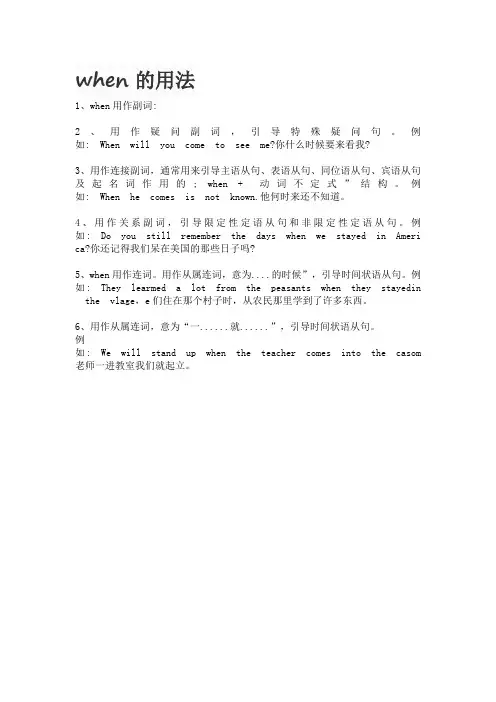
when的用法
1、when用作副词:
2、用作疑问副词,引导特殊疑问句。
例如: When will you come to see me?你什么时候要来看我?
3、用作连接副词,通常用来引导主语从句、表语从句、同位语从句、宾语从句及起名词作用的; when + 动词不定式”结构。
例如: When he comes is not known.他何时来还不知道。
4、用作关系副词,引导限定性定语从句和非限定性定语从句。
例如: Do you still remember the days when we stayed in Ameri ca?你还记得我们呆在美国的那些日子吗?
5、when用作连词。
用作从属连词,意为....的时候”,引导时间状语从句。
例如: They learmed a lot from the peasants when they stayedin the vlage,e们住在那个村子时,从农民那里学到了许多东西。
6、用作从属连词,意为“一......就......”,引导时间状语从句。
例
如: We will stand up when the teacher comes into the casom 老师一进教室我们就起立。
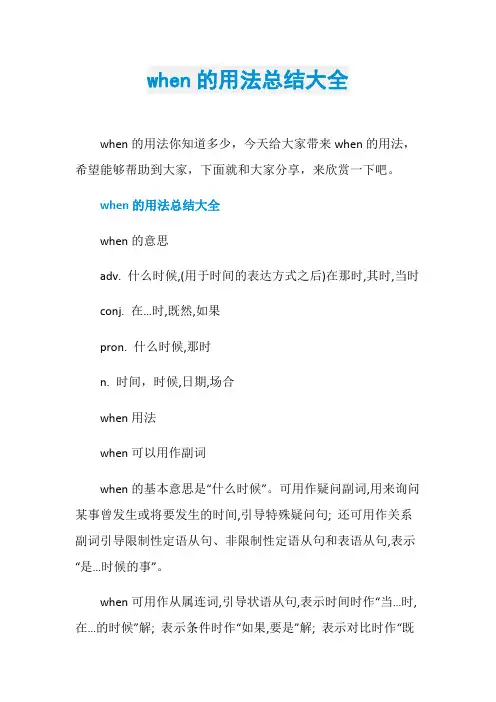
when的用法总结大全when的用法你知道多少,今天给大家带来when的用法,希望能够帮助到大家,下面就和大家分享,来欣赏一下吧。
when的用法总结大全when的意思adv. 什么时候,(用于时间的表达方式之后)在那时,其时,当时conj. 在…时,既然,如果pron. 什么时候,那时n. 时间,时候,日期,场合when用法when可以用作副词when的基本意思是“什么时候”。
可用作疑问副词,用来询问某事曾发生或将要发生的时间,引导特殊疑问句; 还可用作关系副词引导限制性定语从句、非限制性定语从句和表语从句,表示“是…时候的事”。
when可用作从属连词,引导状语从句,表示时间时作“当…时,在…的时候”解; 表示条件时作“如果,要是”解; 表示对比时作“既然,考虑到”解。
当when所引导的从句的主语和主句的主语一致时,常将其主语、系动词或助动词省去,只留实义动词或表语,或者改写为短语。
when所引导的时间状语从句用一般现在时代替将来时,用现在完成时代替将来完成时。
when用作副词的用法例句When did that happen?那件事是什么时候发生的?They stood respectfully when he entered the room.当他走进房间时,他们都恭恭敬敬地站着。
Iron will melt when it is made very hot.当铁烧得很热时就会熔化的。
when可以用作连词when可用作从属连词,引导状语从句,表示时间时作“当…时,在…的时候”解; 表示条件时作“如果,要是”解; 表示对比时作“既然,考虑到”解。
当when所引导的从句的主语和主句的主语一致时,常将其主语、系动词或助动词省去,只留实义动词或表语,或者改写为短语。
when所引导的时间状语从句用一般现在时代替将来时,用现在完成时代替将来完成时。
when用作连词的用法例句And they roared when Seaman held up two fingers.然后当希曼伸出两根指头的时候他们就吼叫起来。
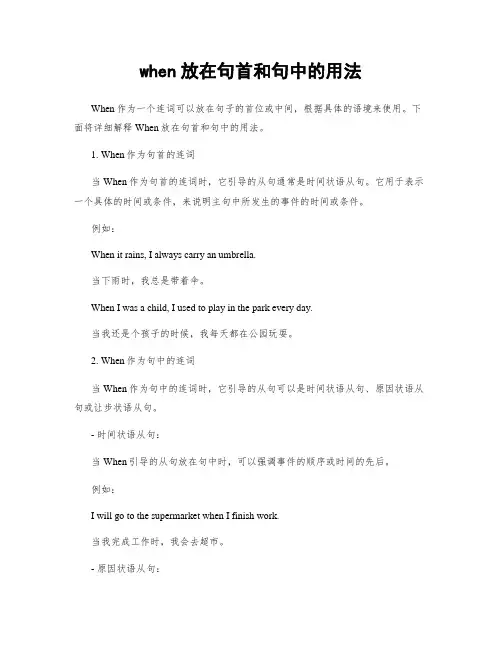
when放在句首和句中的用法When作为一个连词可以放在句子的首位或中间,根据具体的语境来使用。
下面将详细解释When放在句首和句中的用法。
1. When作为句首的连词当When作为句首的连词时,它引导的从句通常是时间状语从句。
它用于表示一个具体的时间或条件,来说明主句中所发生的事件的时间或条件。
例如:When it rains, I always carry an umbrella.当下雨时,我总是带着伞。
When I was a child, I used to play in the park every day.当我还是个孩子的时候,我每天都在公园玩耍。
2. When作为句中的连词当When作为句中的连词时,它引导的从句可以是时间状语从句、原因状语从句或让步状语从句。
- 时间状语从句:当When引导的从句放在句中时,可以强调事件的顺序或时间的先后。
例如:I will go to the supermarket when I finish work.当我完成工作时,我会去超市。
- 原因状语从句:当When引导的从句放在句中时,可以表示一个原因或理由。
例如:I couldn't sleep when I drank too much coffee.当我喝了太多咖啡时,我就无法入睡。
- 让步状语从句:当When引导的从句放在句中时,可以表示尽管某种情况存在,但结果仍然发生。
例如:Even when it's cold outside, I still enjoy going for a walk.即使外面很冷,我仍然喜欢去散步。
总结:无论When放在句首还是句中,它都用于引导从句。
当When放在句首时,引导时间状语从句;而当When放在句中时,可以引导时间状语从句、原因状语从句或让步状语从句。
根据具体的语境,我们可以准确地使用When来描述事件的时间、条件、原因或让步。
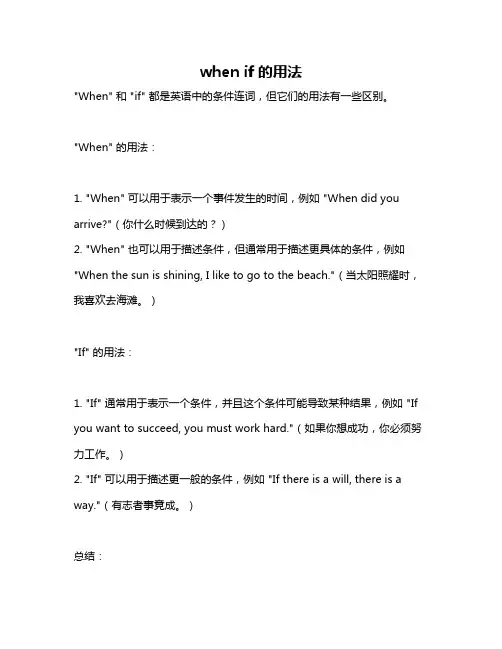
when if的用法
"When" 和 "if" 都是英语中的条件连词,但它们的用法有一些区别。
"When" 的用法:
1. "When" 可以用于表示一个事件发生的时间,例如 "When did you arrive?"(你什么时候到达的?)
2. "When" 也可以用于描述条件,但通常用于描述更具体的条件,例如"When the sun is shining, I like to go to the beach."(当太阳照耀时,我喜欢去海滩。
)
"If" 的用法:
1. "If" 通常用于表示一个条件,并且这个条件可能导致某种结果,例如 "If you want to succeed, you must work hard."(如果你想成功,你必须努力工作。
)
2. "If" 可以用于描述更一般的条件,例如 "If there is a will, there is a way."(有志者事竟成。
)
总结:
"When" 和 "if" 都可以用于描述条件,但 "When" 更侧重于描述时间或情境,而 "If" 更侧重于描述条件和结果。
在具体使用时,可以根据语境选择合适的连词。

when的语法When的语法是一个非常常见的语法规则,它用于表达时间和条件。
在本文中,我将详细介绍when的用法及其相关的语法规则。
一、when作为连接词当when用作连接词时,它连接两个句子或短语,表示时间或条件关系。
比如:1. I was sleeping when the phone rang.(电话响时,我正在睡觉。
)2. I will go shopping when I finish my work.(我完成工作后会去购物。
)在这些例子中,when用来表示某个动作发生的时间或条件。
二、when引导的时间状语从句当when引导的从句作为时间状语修饰主句时,它可以表示一个具体的时间点或一个时间段。
例如:1. I was born in 1990 when my parents were living in New York.(我是1990年出生的,当时我的父母住在纽约。
)2. I always feel happy when I see the sunset.(每当我看到日落时我总是感到快乐。
)这些例子中,when引导的时间状语从句为主句提供了时间背景或条件。
三、when引导的条件状语从句当when引导的从句作为条件状语修饰主句时,它表示一个条件,从而影响主句的结果。
例如:1. When you study hard, you will get good grades.(当你努力学习时,你会取得好成绩。
)2. When it rains, we usually stay at home.(下雨时,我们通常呆在家里。
)在这些例子中,when引导的条件状语从句表达了某个条件,从而决定了主句的结果。
四、when引导的让步状语从句当when引导的从句作为让步状语修饰主句时,它表示一个与主句相反的情况,但并不影响主句的结果。
例如:1. When it was raining heavily, I still went out for a walk.(当天下大雨时,我还是出去散步了。
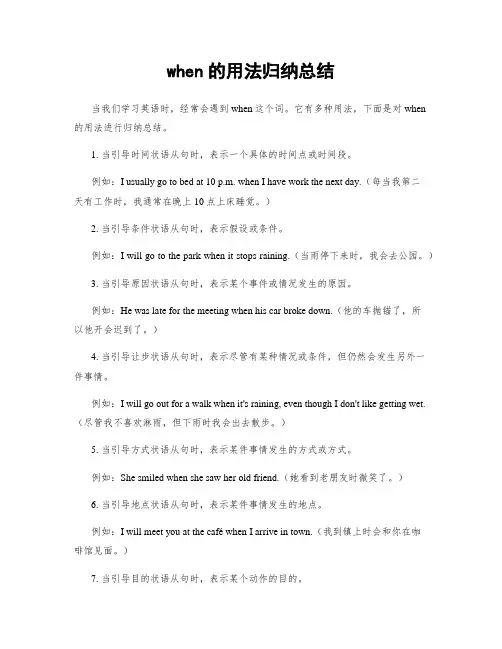
when的用法归纳总结当我们学习英语时,经常会遇到when这个词。
它有多种用法,下面是对when的用法进行归纳总结。
1. 当引导时间状语从句时,表示一个具体的时间点或时间段。
例如:I usually go to bed at 10 p.m. when I have work the next day.(每当我第二天有工作时,我通常在晚上10点上床睡觉。
)2. 当引导条件状语从句时,表示假设或条件。
例如:I will go to the park when it stops raining.(当雨停下来时,我会去公园。
)3. 当引导原因状语从句时,表示某个事件或情况发生的原因。
例如:He was late for the meeting when his car broke down.(他的车抛锚了,所以他开会迟到了。
)4. 当引导让步状语从句时,表示尽管有某种情况或条件,但仍然会发生另外一件事情。
例如:I will go out for a walk when it's raining, even though I don't like getting wet.(尽管我不喜欢淋雨,但下雨时我会出去散步。
)5. 当引导方式状语从句时,表示某件事情发生的方式或方式。
例如:She smiled when she saw her old friend.(她看到老朋友时微笑了。
)6. 当引导地点状语从句时,表示某件事情发生的地点。
例如:I will meet you at the café when I arrive in town.(我到镇上时会和你在咖啡馆见面。
)7. 当引导目的状语从句时,表示某个动作的目的。
例如:I bought a new laptop when I started my new job.(当我开始新的工作时,我买了一台新的笔记本电脑。
)总结:当可以用来引导时间、条件、原因、让步、方式、地点和目的状语从句。

when近义短语When,英语中常用的一个单词,意思是“当……的时候”。
在很多场合下,它常常与其他单词或短语搭配使用,表达更加精准的意思。
在下面的篇幅中,我将为大家介绍一些常用的when近义短语,并谈一谈它们在句子中的运用。
第一个when近义短语是“at the time”。
这个短语通常用来描述某件事情发生的具体时间,与“when”有异曲同工之妙。
例如:“At the time I arrived at the station, the train had already left.”——“当我到车站的时候,火车已经开走了。
”第二个when近义短语是“while/before/after/on/during + -ing”。
这个短语与“when”意义相似,但它强调的是某个动作发生的过程。
例如:“While I was reading, he was watching TV.”——“当我在读书的时候,他在看电视。
”第三个when近义短语是“in the event of”。
这个短语用来描述某个事件发生时可能发生的情况,与“when”相比,更加注重假设和推测。
例如:“In the event of a fire, please use the emergency exit.”——“如果发生火灾,请使用紧急出口。
”当然,这还只是when近义短语的几个例子。
在实际写作中,我们还可以使用更多的近义短语,如“once”、“as soon as”、“if”等等。
但无论使用哪个when近义短语,我们都需要根据语境和表达的意思来选择最合适的近义短语,使句子更加准确、流畅,增强写作的表现力。
就像写作一样,人生中也有很多when的时刻:当我们面临挑战,当我们收获成功,当我们做出决策,当我们追求生活中的美好。
在这些when的时刻,我们需要学习从多个角度去看待问题,做出最好的决策,实现自己的人生价值。
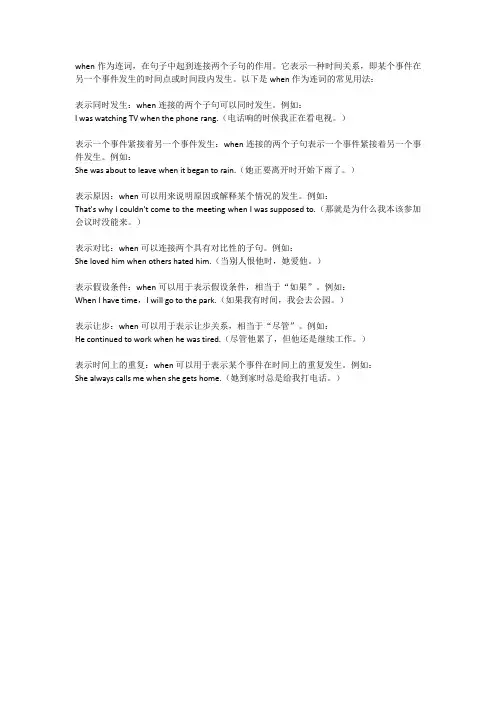
when作为连词,在句子中起到连接两个子句的作用。
它表示一种时间关系,即某个事件在另一个事件发生的时间点或时间段内发生。
以下是when作为连词的常见用法:表示同时发生:when连接的两个子句可以同时发生。
例如:I was watching TV when the phone rang.(电话响的时候我正在看电视。
)表示一个事件紧接着另一个事件发生:when连接的两个子句表示一个事件紧接着另一个事件发生。
例如:She was about to leave when it began to rain.(她正要离开时开始下雨了。
)表示原因:when可以用来说明原因或解释某个情况的发生。
例如:That's why I couldn't come to the meeting when I was supposed to.(那就是为什么我本该参加会议时没能来。
)表示对比:when可以连接两个具有对比性的子句。
例如:She loved him when others hated him.(当别人恨他时,她爱他。
)表示假设条件:when可以用于表示假设条件,相当于“如果”。
例如:When I have time,I will go to the park.(如果我有时间,我会去公园。
)表示让步:when可以用于表示让步关系,相当于“尽管”。
例如:He continued to work when he was tired.(尽管他累了,但他还是继续工作。
)表示时间上的重复:when可以用于表示某个事件在时间上的重复发生。
例如:She always calls me when she gets home.(她到家时总是给我打电话。
)。
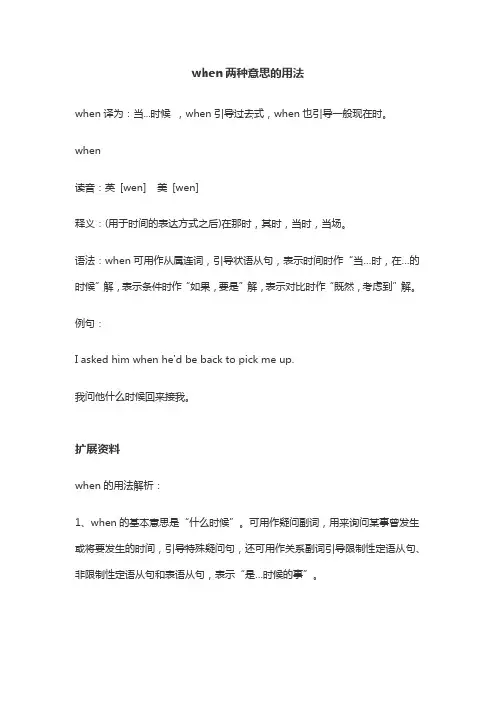
when两种意思的用法
when译为:当...时候,when引导过去式,when也引导一般现在时。
when
读音:英[wen] 美[wen]
释义:(用于时间的表达方式之后)在那时,其时,当时,当场。
语法:when可用作从属连词,引导状语从句,表示时间时作“当…时,在…的时候”解,表示条件时作“如果,要是”解,表示对比时作“既然,考虑到”解。
例句:
I asked him when he'd be back to pick me up.
我问他什么时候回来接我。
扩展资料
when的用法解析:
1、when的基本意思是“什么时候”。
可用作疑问副词,用来询问某事曾发生或将要发生的时间,引导特殊疑问句,还可用作关系副词引导限制性定语从句、非限制性定语从句和表语从句,表示“是…时候的事”。
2、当when所引导的从句的主语和主句的主语一致时,常将其主语、系动词或助动词省去,只留实义动词或表语,或者改写为短语。
3、when所引导的时间状语从句用一般现在时代替将来时,用现在完成时代替将来完成时。
4、when引导的从句作“当…时”或“每逢…”解,从句中的动作既可以和主句中的动作同时发生,也可以在主句的动作之前或之后发生
5、when所引导的从句,其谓语动词既可是持续动词,也可是短暂动词,谓语动词动作发生的时间可以与主句谓语动词的动作是同时,或之前、之后。
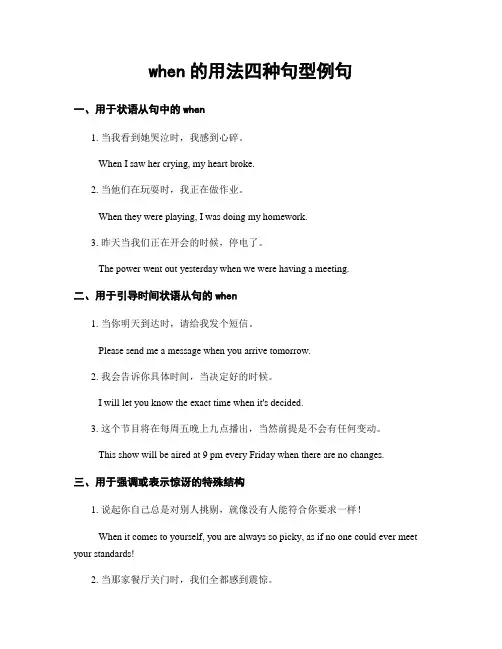
when的用法四种句型例句一、用于状语从句中的when1. 当我看到她哭泣时,我感到心碎。
When I saw her crying, my heart broke.2. 当他们在玩耍时,我正在做作业。
When they were playing, I was doing my homework.3. 昨天当我们正在开会的时候,停电了。
The power went out yesterday when we were having a meeting.二、用于引导时间状语从句的when1. 当你明天到达时,请给我发个短信。
Please send me a message when you arrive tomorrow.2. 我会告诉你具体时间,当决定好的时候。
I will let you know the exact time when it's decided.3. 这个节目将在每周五晚上九点播出,当然前提是不会有任何变动。
This show will be aired at 9 pm every Friday when there are no changes.三、用于强调或表示惊讶的特殊结构1. 说起你自己总是对别人挑剔,就像没有人能符合你要求一样!When it comes to yourself, you are always so picky, as if no one could ever meet your standards!2. 当那家餐厅关门时,我们全都感到震惊。
We were all shocked when that restaurant closed down.3. 当海浪来袭时,他们立即意识到要采取行动。
When the waves came crashing, they immediately realized they had to take action.四、用于名词性从句中的when1. 他告诉我他会参加会议的时间,然而并没有告诉我具体日期。
when能引导三大从句,分别是状语从句、名词性从句和定语从句。
1. when引导状语从句:when及所引导从句代表一个时间,整体作主句的状语;翻译成:某某事发生的时间;when作从句的状语。
例如:It's cold when it snows. 一下雪天就冷。
2. when引导名词性从句:when及所引导的从句是一个完整的特殊疑问句,只是语序有差别;翻译成:什么时间发生某某事;when本身在从句中充当疑问词。
例如:I have no idea when he will come back home.我不知道他什么时候回来。
3. when引导定语从句:when及引导的从句紧跟在先行词后面;when=介词+which(表时间)在从句中作状语;翻译成:某某事发生的时间。
例如:I enjoyed the evening when we stayed together by the sea.我很享受这个我们在海边待在一起的夜晚。
when在开头的用法When开头的用法是当在句子开头加上when时,用来表达一个具体或抽象的假设,提出一种假设或提问,从而得到语义上的完整性。
When开头的句子有三种常见的语义:时间、条件和原因。
在一般情况下,when作为一个连词,用来引出一个句子,并作为一个关联词,连接另一句话,以便建立一个更大的句子。
When副词表示“当……时”,主要指某个时候。
用作连词,通常表示“当……时,为此,发生某种结果”。
When连词作为引导句子使用时,常常搭配表示条件的副词如if, supposing, unless, provided等。
这样的句子叫做条件句,表示“如果……将会怎样”。
例如:When the weather is fine, I often go swimming.这里When表示“如果”,表达的意思就是“如果天气好的话,我就去游泳”。
When的第二个常见用法是做时间连词来使某个动作与过去的另一个动作有联系,或者使某个动作与未来另一个动作有联系。
例如:I will write to you when I have time.这里when表示时间,表达的意思就是“我会在有时间的时候给你写信”。
最后一种when开头的句子是原因状语句,一般来说,when表示“由于”或“因为”。
例如:He lost his job when his company went bankrupt.这里when表示原因,表达的意思就是“他的公司破产时,他失去了工作”。
总之,当用when来引导句子时,虽然其语义也非常复杂,但是它的基础语义主要是表示“当……时”,“如果…….就……”,“由于………所以……”。
这样就可以灵活地使用它来表达不同语义上的完整思路。
when的词源1. 嘿,你知道“when”这个词的词源吗?它可有着很有趣的来历呢。
“when”源于古英语的“hwænne”,就像是一个神秘的宝藏,藏着时间的秘密。
比如说,“When will youe?”(你什么时候会来?)这简单的一句话里,“when”就像一把钥匙,开启了对未来某个时刻的询问。
2. 哇哦,“when”这个词源啊,就像是一条流淌在语言长河里的小溪。
古英语中的“hwænne”逐渐演变成了今天的“when”。
就好比一颗小种子慢慢长成了大树。
像在句子“He knows when to stop.”(他知道何时停止。
)里,“when”精准地指出了那个特定的时间点,是不是很神奇呢?3. 我跟你说啊,“when”的词源真的很迷人。
它从古老的根源一路走来。
古英语“hwænne”是它的源头,这就像是祖先给我们留下的一个语言密码。
拿“Tell me when you are ready.”(告诉我你什么时候准备好。
)来说,“when”就像是一个信号灯,指示着某个时刻的来临。
4. 哟,“when”这个词的诞生肯定有个奇妙的故事。
它来自古英语的“hwænne”。
这就像是一个神秘的魔法咒语,经过岁月的演变有了现在的模样。
例如“ When she arrives, we will start.”(当她到达的时候,我们就开始。
)这里的“when”就像是一个等待被触发的机关。
5. 嘿呀,你有没有想过“when”的词源呀?它可是从古英语“hwænne”那儿来的呢。
这就如同一个古老的传说在现代语言里延续。
想象一下在句子“When the sun rises, the day begins.”(当太阳升起的时候,白天就开始了。
)里,“when”像一个开启白昼的开关。
6. 哎呀,“when”的词源就像是一个隐藏在语言深处的小秘密。
它起始于古英语“hwænne”。
when的特殊用法"when" 是一个英语单词,通常用作关联副词(subordinating conjunction)或疑问副词(interrogative adverb)。
这个词有一些特殊的用法,以下是其中几个例子:1. 关联副词(When as a subordinating conjunction):- I will call you when I arrive. (当我到达时,我会给你打电话。
)- She gets nervous when she has to speak in public. (她在公开场合讲话时会紧张。
)在这种用法中,"when" 引导一个时间或条件从句,指明主句中的动作发生的时间或条件。
2. 疑问副词(When as an interrogative adverb):- When did you last visit the museum? (你上一次参观博物馆是什么时候?)在这种用法中,"when" 用于引导疑问句,询问时间。
3. 连词(When as a conjunction):- I was surprised when he told me the news. (当他告诉我这个消息时,我感到很惊讶。
)在这种情况下,"when" 连接两个句子,表示一个事件发生的时间关系。
4. 替代“如果”(When meaning 'if'):- When in doubt, ask for help. (如果有疑问,就寻求帮助。
)在某些情况下,"when" 可以用来替代"if",表示条件。
总的来说,"when" 的用法多种多样,可以表示时间、条件,也可以用于构建疑问句。
要根据上下文来确定其确切含义。
when主将从现的用法"when"是一个英语词汇,主要作为连词使用,表示时间或条件条件。
在句子中,"when"用于引导一个从句,用于表达主将从现的关系。
以下是"when"主将从现的用法解释:主句通常使用将来时态的动词,表示将来的行为、计划或预测。
从句使用一般现在时态的动词,表示在主句所表述的条件或时间点下发生的行为。
这种结构用于表达预期将来发生的事情的特定条件或时间。
以下是一些示例句子,展示了"when"主将从现的用法:1.I will call you when I arrive home.(当我到家时,我会给你打电话。
)在这个例子中,“I will call you”表示将来的行为,而“when I arrive home”表示发生的条件,即到达家中。
2.She will go to the party when she finishes her work.(她完成工作后,会去参加聚会。
)这个句子中,“She will go to theparty”表示将来的行为,而“when she finishes her work”表示完成工作的条件。
3.We'll start the game when everyone is ready.(当每个人都准备好时,我们会开始游戏。
)这个例句中,“We'll start thegame”表示将来的行为,而“when everyone is ready”表示准备好的条件。
总的来说,"when"主将从现的用法是指主句使用将来时态的动词,从句使用一般现在时态的动词,用于表达将来发生的行为所依赖的条件或发生时机。
这种结构常用于英语语法中,用于描述特定的时机或条件下发生的行为。
英文when的汉语是什么意思when的`汉语意思英 [wen] 美 [wɛn]副词当时; 什么时候; (用于时间的表达方式之后)在那时; 其时连词如果; 在…时; 既然代词什么时候; 那时名词时间,时候; 日期; 场合例句1. We have only three books when we need five.虽然我们需要五本书,却只有三本。
2. We'll start when the team leader comes.队长一来,我们就出发。
when的单语例句1. He was only a bag of bones when he first went to the centre.2. While Li said he had not had contact with Wu in the past, police discovered they had done business together when Wu operated a television media company.3. But when it involves political tricks, business will come to an end soon.4. But the truth is that business thrives on integrity, and the end justifies the means only when both are justified.5. When afternoon comes, she changes into her business suit and becomes a marketing specialist at an English magazine.6. One man said he was riding a bicycle across a bridge over the Metro tracks when the sound of the collision got his attention.7. When more people benefit from the business, it will bite deep into the ethics of academics.8. When Li renewed the mine's license in 2000, he changed the business into a private firm of his own.9. Bravo first started the acrylic paintings on tortillas when he was in college and couldn't afford canvases.when的词典解释1. (用于疑问句)什么时候,何时You use when to ask questions about the time at which things happen.e.g. When are you going home?...你什么时候回家?e.g. When did you get married?...你什么时候结的婚?2. (表示两事同时发生)在…时,当…时If something happens when something else is happening, the two things are happening at the same time.e.g. When eating a whole cooked fish, you should never turn it over to get at the flesh on the other side...吃一整条鱼时,切忌把它翻过来去吃另一面的肉。
Exercise of when, while
一.用when或while填空
1. _____ the teacher came in, we were talking.
_____ we were talking, the teacher came in.
2. He was driving along ____ suddenly a woman appeared.
3. ____ Jack was waiting at the door, an old woman called to
him.
4. He was reading a book ____ suddenly the telephone rang.
5. ____ it began to rain, they were playing chess.
6. She saw a taxi coming ____ the woman was waiting under
the streetlight.
7. While Jack _________(look) for customers, he _______(see)
an old man.
8. John __________(sleep) when someone_____(steal) his car.
9. He is strong_____ his brother is weak.
10. The children were running to move the bag of rice ______
they heard the sound of a motor bike.
Exercise of noun.
一.选择填空
1. There are living a few______ at the foot of the hill.
A. families
B. family
C. people
D. person
2. --How did you enjoy the concert last night?
--______
A. What a disappointment!
B. What a failure!
C. Awful!
D. Very dissatisfactory!
3. The shoes ___ mine, but that pair of shoes ___ my brother’s.
A. is, is
B. is, are
C. are, are
D. are, is
4. They got much _____ from those new books.
A. ideas
B. photos
C. news
D. stories
5. I have two _______ and three bottles of _________ here.
A. orange, orange
B. oranges, oranges
C. oranges, orange
D. orange, oranges
6. Every evening M r. King takes a _________ to his home.
A. 25 minutes’ walk
B. 25 minute’s walk
C. 25 minute walk
D. 25 minutes walk
7. An old _______ wants to see you.
A. people
B. person
C. the people
D. the person
8. ________ mothers couldn’t go to the meeting, because they have gone to Shanghai .
A. Mary and Peter’s
B. Mary and Peter
C. Mary’s and Peter
D. Mary’s and Peter’s
9. Li Lei has been to __________ many times this month.
A. her uncle
B. her uncle’s
C. her uncles
D. aunt’s
10. He is a success as a leader but he hasn’t ________ in teaching.
A. many experiences
B. much experience
C. an experience
D. a lot experience
11. A classmate of _________ was here ten minutes ago.
A. you
B. your
C. your sister
D. your sister’s
12. A group of _________ are talking with two ___________.
A. Frenchmen, Germans
B. Germans , Frenchmans
C. Frenchmans , Germen
D. Germen , Frenchmen
13. The team ________ having a meeting.
A. is
B. are
C. am
D. be
14. “Would you like _________?”“________,please.”
A. drink, Three coffees
B. a cup of drink, Coffees
C. a drink, a coffee
D. a drink, Three cups of coffees
15. The Great Wall was made not only by _______, but also the flesh and blood of ________ men.
A. earth and stone, millions of
B. earths and stones, millions
C. the earth and stone, million of
D. the earths and stones, millions
16. Help yourself to __________.
A. chickens and apples
B. chickens and apple
C. chicken and apple
D. chicken and apples
17. Oh, dear. I forgot the two _________.
A. room’s number
B. rooms’ number
C. room numbers
D. rooms’ numbers
18. She has been in Tianjin for ten years. Tianjin has become her second _________.
A. family
B. house
C. home
D. room
19. Excuse me, how can I get to the nearest ___ shop?
A. shoes
B. shoe
C. shoes’
D. shoes
20. You need more ___ to keep fit.
A. practice
B. train
C. exercises
D. exercise。